I am sole author of four monographs. I have also edited the complete poems of Ben Jonson and William Shakespeare.
Imitating Authors: Plato to Futurity (Oxford, 2019)
470 pages. Imprint: Oxford University
Press. ISBN 0198838085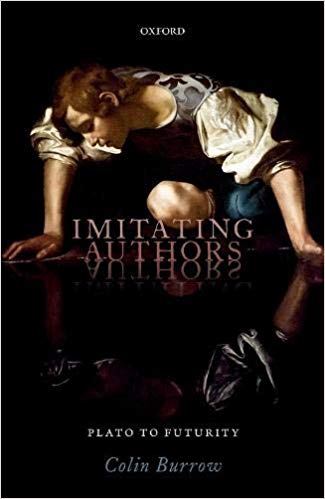
This is a study of the theory and
practice of imitatio (the imitation of one author
by another) from antiquity to the present day. It extends from early
Greek texts right up to recent fictions about clones and artificial
humans, and illuminates both the theory and practice of imitation.
At its centre lie the imitating authors of the English Renaissance,
including Ben Jonson and the most imitated imitator of them all,
John Milton.
Imitating Authors argues that
imitation was not simply a matter of borrowing words, or of alluding
to an earlier author. Imitators learnt practices from earlier
writers. They imitated the structures and forms of earlier writing
in ways that enabled them to create a new style which itself could
be imitated. That made imitation an engine of literary change. Imitating
Authors also shows how the metaphors used by theorists
to explain this complex practice fed into works which were
themselves imitations, and how those metaphors have come to
influence present-day anxieties about imitation human beings and
artificial forms of intelligence. It explores relationships between
imitation and authorial style, its fraught connections with
plagiarism, and how emerging ideas of genius and intellectual
property changed how imitation was practised. The main aim of the
book is to defend imitation and to explain how the larger history of
the classical tradition and its reception shapes how we think in
many areas which might not appear to be directly related to that
tradition, such as arguments about cloning and artificial
intelligence. It ends up with a discussion of Frankenstein,
clones, robots and artificial intelligence.
Shakespeare and Classical Antiquity (Oxford, 2013)
296 pages. Imprint: Oxford University Press. ISBN 978-0199684793.
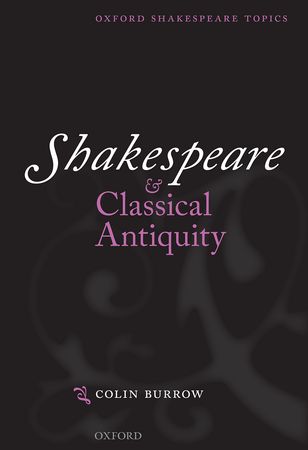 Small Latin and less Greek?
No. This book is about what Shakespeare made of his considerable
classical knowledge. There is lots of introductory stuff in it about
Virgil and Ovid and Plutarch and Seneca and Terence and Plautus, as
well as about the nature of Shakespeare's classical education,
because it is in a series of introductory books. But OUP were very
indulgent (and I am grateful to them) in letting me go way
overlength and say a lot of things about Shakespeare's use of the
classical past, and how it interacts with his relationships to his
own times and his education, which aren't introductory at all,
though I hope they're put clearly enough so that you don't have to
know a lot to be able to understand what I am saying. It's dedicated
to the late Emrys Jones, who was my Ph.D. supervisor, and it's a
kind of tribute to his attempts to think broadly and imaginatively
about where Shakespeare came from in The Origins of Shakespeare.
It was planning to give him a copy as a surprise. But I was too
slow. It's about how a grammar school boy used what he knew to
become the best dramatist among his contemporaries, and probably the
best dramatist ever. A stirring tale.
Small Latin and less Greek?
No. This book is about what Shakespeare made of his considerable
classical knowledge. There is lots of introductory stuff in it about
Virgil and Ovid and Plutarch and Seneca and Terence and Plautus, as
well as about the nature of Shakespeare's classical education,
because it is in a series of introductory books. But OUP were very
indulgent (and I am grateful to them) in letting me go way
overlength and say a lot of things about Shakespeare's use of the
classical past, and how it interacts with his relationships to his
own times and his education, which aren't introductory at all,
though I hope they're put clearly enough so that you don't have to
know a lot to be able to understand what I am saying. It's dedicated
to the late Emrys Jones, who was my Ph.D. supervisor, and it's a
kind of tribute to his attempts to think broadly and imaginatively
about where Shakespeare came from in The Origins of Shakespeare.
It was planning to give him a copy as a surprise. But I was too
slow. It's about how a grammar school boy used what he knew to
become the best dramatist among his contemporaries, and probably the
best dramatist ever. A stirring tale.
The Poems,in The Cambridge Edition of the Works of Ben Jonson (Cambridge, 2012)
5224 pages. Imprint: Cambridge University Press. ISBN 9780521782463.
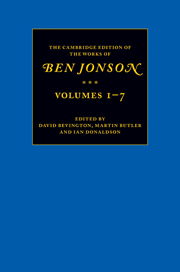 This seven volume edition of Ben Jonson's
works contains all the poems, plays and masques, and was a major
project undertaken by a large team of editors. I edited all the
poems. Those in the major collections (the Epigrams, the Forest,
and the Underwood) are printed in the order in which they
appeared in those collections. Each poem that makes up what Herford
and Simpson called 'the ungathered Verse' (dedicatory and occasional
poems which Jonson never included in a collection of poems) is
printed at the appropriate place in the historical sequence of
Jonson's works. The edition is modernized, and takes account of the
huge volume of manuscript materials which have come to light over
the past decades. Several poems, particularly in the Underwood
include new readings, and, in one case, two new authentically
Jonsonian lines. An online supplement to the edition, which should
be available shortly, will add greatly to the collation of
manuscript variants. A textual
essay on the poems is freely available online and gives some
indication of the nature of the venture, and its difficulty. The
original plan was for CUP to print separate paperback volumes
containing the most popular elements of the edition, so it may be
that at some future date I will produce a free-standing edition of
the poems, but that is up to the publisher.
This seven volume edition of Ben Jonson's
works contains all the poems, plays and masques, and was a major
project undertaken by a large team of editors. I edited all the
poems. Those in the major collections (the Epigrams, the Forest,
and the Underwood) are printed in the order in which they
appeared in those collections. Each poem that makes up what Herford
and Simpson called 'the ungathered Verse' (dedicatory and occasional
poems which Jonson never included in a collection of poems) is
printed at the appropriate place in the historical sequence of
Jonson's works. The edition is modernized, and takes account of the
huge volume of manuscript materials which have come to light over
the past decades. Several poems, particularly in the Underwood
include new readings, and, in one case, two new authentically
Jonsonian lines. An online supplement to the edition, which should
be available shortly, will add greatly to the collation of
manuscript variants. A textual
essay on the poems is freely available online and gives some
indication of the nature of the venture, and its difficulty. The
original plan was for CUP to print separate paperback volumes
containing the most popular elements of the edition, so it may be
that at some future date I will produce a free-standing edition of
the poems, but that is up to the publisher.
Manuscript Miscellanies c. 1450-1700, English Manuscript Studies 1100-1700 volume 16 (London, 2011)
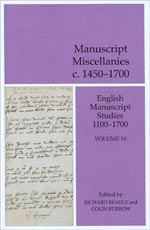 256
pages. 35 halftones. Imprint: The British Library. ISBN
9780712358279.
256
pages. 35 halftones. Imprint: The British Library. ISBN
9780712358279.
This collection of essays edited jointly with Richard Beadle was a printed output arising from the Scriptorium Project, an AHRC funded project to digitize a range of different commonplace books and miscellanies from the late medieval period to the very end of the seventeenth century. It includes a wide range of essays by international experts on manuscript studies (including Julia Boffey, Arthur Marotti, and Steven May) on a variety of manuscripts, from poetic miscellanies to works which defy definition because of their extreme miscellaneity. The volume also contains an essay by Angus Vine on Francis Bacon's use of waste-books and ledgers, which has some profound implications about early modern learning.
Metaphysical Poetry (London, 2006)
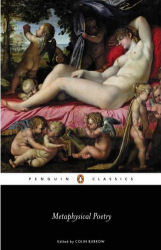 400
pp. Imprint: Penguin. ISBN 0-14-042444-X (Paperback only)
400
pp. Imprint: Penguin. ISBN 0-14-042444-X (Paperback only)
This volume replaces Helen Gardner's good but rather staid anthology of The Metaphysical Poets, which has been in print since the 1960s. It presents freshly edited and modernised texts, including several which have never been reprinted before, a host of old favourites by Donne, Marvell, Herbert, and Vaughan, and some poems from manuscript which have never been printed in any form before. It also includes more erotic poems, more poems by women, and more political poems than its predecessor. Producing the edition was a challenge, since the orthodox line now has it that 'the metaphysical poets' entered the literary canon in the early twentieth century as part of an attempt to establish a conservative picture of seventeenth century literary history. As a result most recent literary histories avoid the term. I argue that although it is not helpful to talk of 'the metaphysical poets', as though they were a tribe or a breed, nonetheless 'metaphysical poetry' is a useful label for a group of seventeenth century poems which imitate Donne. The introduction presents a history of this family of poems, which are characterised by an ironical relationship to their own arguments, and which respond in various ways to the changing circumstances of the seventeenth century. The volume includes a useful timeline and bibliography as well as a fairly substantial introduction and notes.
Shakespeare: Troilus and Cressida (London, 2006)
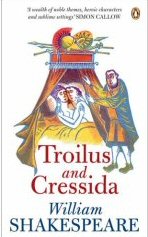 320
pages. Imprint: Penguin Books Ltd. ISBN 0-14-1016698 (paperback)
320
pages. Imprint: Penguin Books Ltd. ISBN 0-14-1016698 (paperback)
Troilus was for a long time a relatively neglected play. It is in a way Shakespeare's experiment with epic, and is partly, though only partly, about bringing epic heroes down to size. It also is the result of deep thinking about what it is to be embodied, and the consequences of living in an environment where reputation matters. I wrote the new introduction to this reissue of R.A. Foakes's Penguin edition of the play. It explains how the play relates to ideas about personal identity and fame in the period, and explores how Shakespeare used his sources, as well as having some things to say about love and time. There is also a section on 'The Play in Performance' and an updated bibliography.
Shakespeare: The Complete Sonnets and Poems (Oxford, 2002)
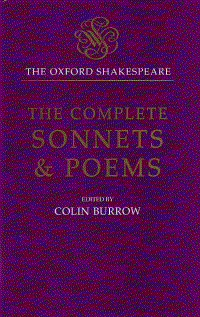
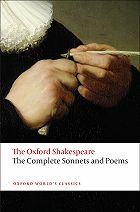
750 pp. Imprint: Oxford. ISBN 0-19-818431-X (hardback) 0-19-281933-X (paperback)
This is a one volume modernised text with full annotation of all of Shakespeare's poems (Sonnets, Venus and Adonis, Lucrece, A Lover's Complaint, The Passionate Pilgrim, and a group of poems attributed to Shakespeare in the seventeenth century), with a book-length introduction. The Arden Shakespeare and the Cambridge Shakespeare both divide the materials included here into two volumes, with the result that few students are encouraged to think about how the Sonnets relate to the rest of Shakespeare's writing as a poet. The full text of the 170 page introduction also gives a detailed account of the sources and contexts of the works included in the edition. The notes try to make the poems intelligible to as many people as possible, and provide detailed definitions from the Oxford English Dictionary, as well as citations of source material and parallels, and a number of corrections of the OED. The whole volume is 750 pages, and the paperback (published 30 April 2002) is attractively priced and well produced, for which I am very grateful to OUP.
Edmund Spenser (Plymouth,1996)
118 pages. Imprint: Northcote House. ISBN Paperback, 0-7463-0750-0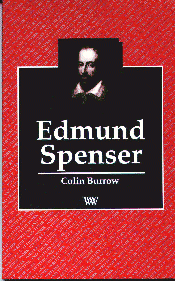
The new series of Writers and Their Work (printed in association with The British Council) continues a tradition of innovative critical studies introducing writers and their contexts to a wide range of readers.
Edmund Spenser (?1554-99) was the greatest Elizabethan poet, whose Shepheardes Calender (1579) inaugurated a revolution in English poetry, and whose unfinished epic The Faerie Queene (1590-6) was the longest and most accomplished poem written in the sixteenth century. This introduction, intended to be read by anyone who is interested in the poem, clarifies the genres and conventions at work in Spenser's poem. It explores and explains the poet's taste for archaism and allegory, as well as discussing the nature of epic and of heroism in The Faerie Queene. The book presents Spenser as a 'Renaissance' poet, who is drawn at once to images of vital rebirth and mortal frailty. The book examines Spenser's equivocal relationship with his Queen and with the Irish landscape in which he spent his mature years. Spenser emerges from this book as a less orthodox and harmonious poet than he is often thought to be, but as a complex, thoughtful, and attractive writer.
Epic Romance: Homer to Milton (Oxford, 1993)
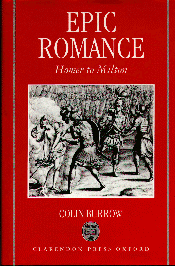
336 pages. Imprint: Clarendon Press. ISBN Hardback, 0-19-811794-9
This book presents a comprehensive study of the epic tradition from Homer, through Virgil, Ariosto, Tasso, Spenser, and the host of minor writers who helped to create the idiom within which these poets worked, to the great achievements of Milton. Detailed studies of individual authors in historical context link to develop a powerful explanation of how and why the epic changed from Homer to Milton.
The book shows how the romance hero, whose prime motives are love and pity, emerged from a sequence of reinterpretations of Homer which runs through Virgil's Aeneid and its medieval redactions to Ariosto's Orlando furioso. Relating the rise of the romance hero to the digressive, decentred form of romance, it explores the ways in which later writers sought to control the digressive energies of the romance hero and to create a language and form of heroism more akin to those of classical epic. This analysis leads to a fresh account of the ways in which Renaissance writers responded to, and moved tentatively towards, the writing of the past. Arguing against the view that Ariosto, Tasso, Spenser and Milton were engaged in a battle for mastery over their predecessors, the book reveals how they transformed the received interpretations of past epic in order to draw closer to the narrative forms of their classical forebears.